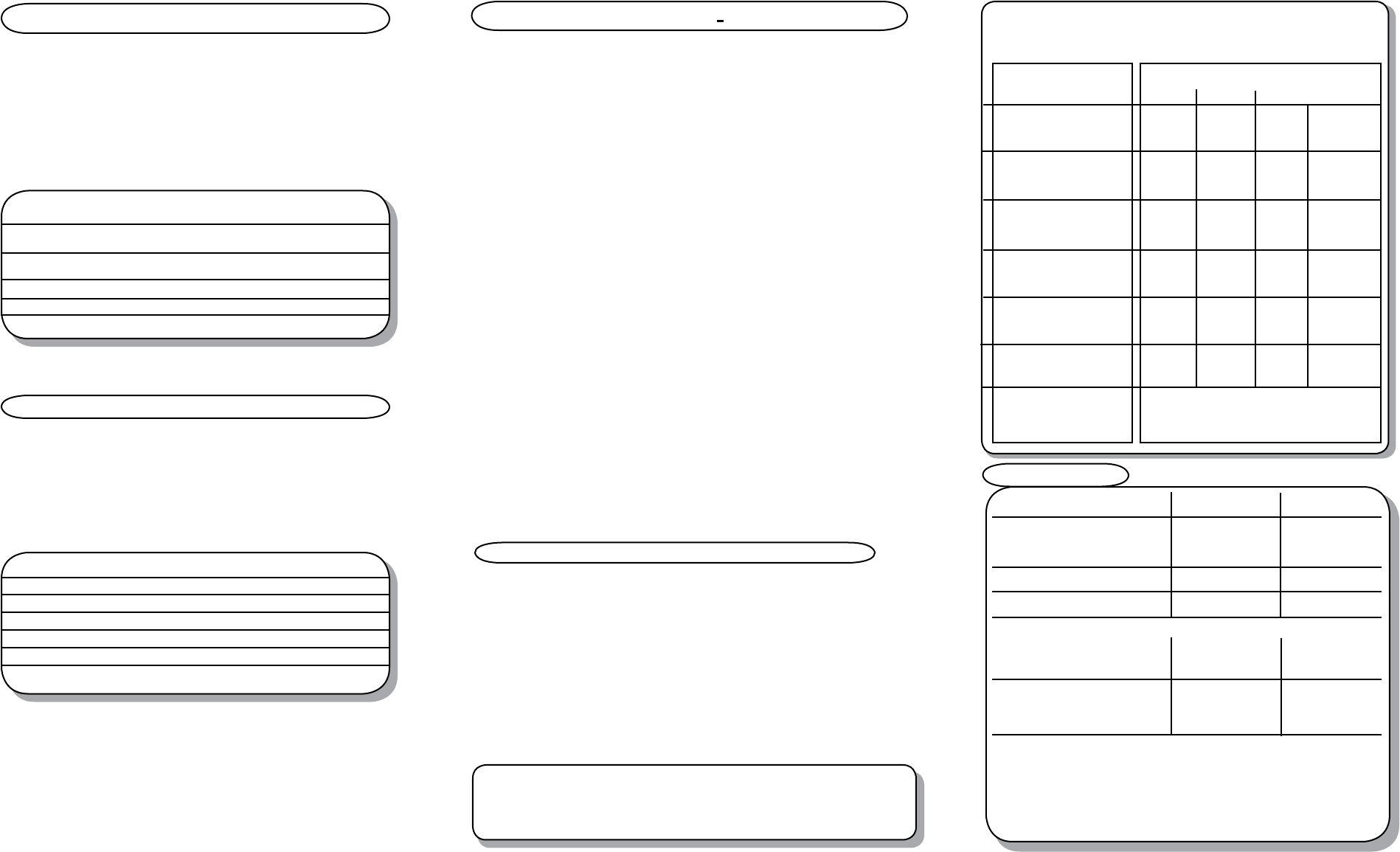
Having the proper battery or amount of batteries for the
system to be powered is extremely important to the life of
the battery. When planning your power delivery system
make sure you have the right amount of battery power so
as to not discharge the battery too deeply during normal
operation. Even though the Stinger batteries have the
best deep cycling ability in the market, the deeper the
battery is cycled the shorter the life expectancy will be.
Typical Stinger POWER battery Cycling
Ability vs. Depth of Discharge
Depth of Discharge
100%
50%
30%
10%
Typical Life Cycles
350
600
1500
3500
State of Charge vs. Open Circuit Voltage
Please discuss battery selection with your Stinger
®
dealer
prior to installation if you have any questions.
State of Charge
100%
75%
50%
25%
0%
Open Circuit Voltage
12.85 volts
12.5 volts
12.2 volts
11.9 volts
11.6 volts
Battery Testing
SPV35 SPV44 SPV70
Dimensions: 8-1/4” Wide 7-3/4” Wide 13-3/4” Wide
5” Deep 6-1/2” Deep 6-1/2” Deep
7-3/4” High 6-3/4” High 6-7/8” High
Weight: 27.56 lbs. 36.52 lbs. 57.3 lbs.
Internal Resistance: <6 mOhms <5 mOhms <4 mOhms
Constant Discharge Capacity at 77
o
F to 10.50 Volts:
20 hour rate: 1.75A/35Ah 2.2A/44.0Ah 3.5A/70Ah
5 hour rate: 5.95A/29.75Ah 7.48A/37.4Ah 11.9A/59.5Ah
.5 hour rate: 43.75A/21.9Ah 55.0A/27.5Ah 87.5A/43.75Ah
Rapid Discharge Capacity:
5 sec. Burst: 525 Amps 660 Amps 1050 Amps
CCA: 438 Amps 550 Amps 875 Amps
General POWER Battery Information:
Battery Design: 12V Dry Cell VRLA
Typical Cycle Life: 350 cycles @ 100% depth of discharge
(100% depth of discharge is down to 10.5 volts. No lower!)
Proper Battery Selection
Testing your POWER battery to determine its functional
condition can be done in two ways. The first is to test the
open circuit voltage of the battery to determine the state of
charge with a voltmeter. Testing Open Circuit Voltage
means testing the battery’s voltage with nothing connected
to the battery (disconnect one terminal). Consult the chart
below to compare your readings:
The second way to test the battery is by using a load
tester (usually available at your Stinger
®
dealer or most
auto service centers). A load test is performed on batter-
ies that are suspect of having reduced output capacity.
For example a battery’s open circuit voltage tests good but
the battery is unable to support a load.
Approximate Charging Times
based on using a Current Tapering Charger set at
14.7 to 15 volts and 100% re-charge.
Automotive
Current Tapering
Charger Rated @:
15 amps
20 amps
30 amps
40 amps
50 amps
100 amps
Hours to Charge
SPV35 SPV44 SPV70
16 hr. 20 hr. NR Minimum
24 hr. 30 hr. NR Maximum
12 hr. 16 hr. 20 hr. Minimum
16 hr. 24 hr. 30 hr. Maximum
5 hr. 12 hr. 16 hr. Minimum
10 hr. 16 hr. 24 hr. Maximum
5 hr. 5 hr. 12 hr. Minimum
8 hr. 10 hr. 16 hr. Maximum
NR 5 hr. 5 hr. Minimum
8 hr. 10 hr. Maximum
NR NR 3 hr. Minimum
6 hr. Maximum
NR= Not Recommended
Proper charging is crucial for proper performance of the POWER
battery. We recommend keeping the POWER battery’s voltage
maintained at 12.8 volts (open circuit) by means of a properly
designed regulated charging system. If your battery has been
discharged well below the recommended 12.8 volts we recom-
mend following chart to the right for proper recharging of the
POWER battery. The charging times stated are using an automo-
tive Current Tapering Charger or otherwise know as a Constant
Voltage Charger. These chargers are microprocessor controlled
and will regulate the charge voltage and current far better than
the run of the mill automotive power charger. Contact Stinger
®
for more information on how to obtain one of these superior
chargers.
Never use an inexpensive constant current or “trickle”
charger! These chargers do not have regulated charging abili-
ties. They can overcharge the POWER battery causing severe
damage to the battery. Even a small amount or .5 amp from a
trickle charger if left on after the battery is fully charged will
overcharge the battery. Overcharging will overheat and dry out
the electrolyte causing the battery to fail prematurely.
Overcharged batteries are not covered under warranty.
An undercharged battery not only has a temporary reduction in
capacity, if left in an undercharged state or continually under-
charged, the capacity and life of the battery will be permanently
reduced. The battery warranty does not cover batteries
that fail due to undercharging. For this reason we recom-
mend that you keep the battery fully charged at all times with a
properly designed charging system that charges at 13.8 volts for
float/standby usage and 14.5-15 volts in cyclic applications.
Important Charging Information
Specifications
Any of the following actions will void the warranty!
Exposure of battery to gasoline or diesel fuel.
Removal of the battery’s top cover.
Removing or destroying the battery’s shipping date code.
Long Time Vehicle Storage
If you are going to store your vehicle for longer than 30 days you will
need to take the following steps to prevent long term damage to the
POWER battery.
1. Disconnect the battery from any and all power draining devices.
2. Do not leave a trickle charger on the battery. This will overcharge the
battery.
3. If you have components that need to stay powered during storage ie;
car alarm system, you may use a battery tender device. They have a
regulated output that will monitor battery voltage closely and keep the
battery at peak voltage. Choose a tender that has the ability to reduce
charge to .05 amps (five hundredths of an amp, not half an amp).




